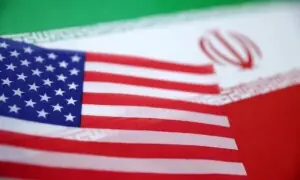Beijing deal for post-war Gaza leaves analysts skeptical
3 min readPalestinian president Mahmud Abbas’s Fatah movement has agreed with Hamas to form a “national unity government” in post-war Gaza, but analysts are sceptical about the significance of the Beijing-brokered deal.
The agreement, signed by more than a dozen Palestinian factions on Tuesday, aims to find common ground for future Palestinian political institutions, which are currently divided between the Fatah-dominated Palestinian Authority in the occupied West Bank and Hamas in the Gaza Strip.
Analysts interviewed by AFP said they were still trying to assess the significance of the Chinese initiative but one said it risked being little more than a “piece of paper” given the Palestinian factions’ long history of failed reconciliation bids.
Chinese Foreign Minister Wang Yi said the agreement clears the way for an “interim national reconciliation government” for the West Bank and post-war Gaza.
“Today we sign an agreement for national unity… We are committed to national unity and we call for it,” Hamas envoy Musa Abu Marzuk said after Tuesday’s signing ceremony.
Read more
Beijing says attempts to sabotage China-Pakistan cooperation will not succeed
Cold wave sends Beijing’s temperatures towards historic lows
The idea of a post-war government of technocrats for Gaza has been floated since the first months of the conflict triggered by Hamas’s unprecedented attacks on Israel on October 7 last year.
“Informal meetings between Fatah and Hamas are taking place all the time,” said Joost Hiltermann, Middle East director for the International Crisis Group.
The latest negotiations in China accomplished “little to nothing”, he told AFP.
Tahani Mustafa, a senior Palestinian analyst for the ICG, said the deal should be seen in the context of recent moves by some European governments to recognise the State of Palestine. Palestinian president Mahmud Abbas’s Fatah movement has agreed with Hamas to form a “national unity government” in post-war Gaza, but analysts are sceptical about the significance of the Beijing-brokered deal.
The agreement, signed by more than a dozen Palestinian factions on Tuesday, aims to find common ground for future Palestinian political institutions, which are currently divided between the Fatah-dominated Palestinian Authority in the occupied West Bank and Hamas in the Gaza Strip.
Analysts interviewed by AFP said they were still trying to assess the significance of the Chinese initiative but one said it risked being little more than a “piece of paper” given the Palestinian factions’ long history of failed reconciliation bids.
Chinese Foreign Minister Wang Yi said the agreement clears the way for an “interim national reconciliation government” for the West Bank and post-war Gaza.
“Today we sign an agreement for national unity… We are committed to national unity and we call for it,” Hamas envoy Musa Abu Marzuk said after Tuesday’s signing ceremony.
Read more
Beijing says attempts to sabotage China-Pakistan cooperation will not succeed
Cold wave sends Beijing’s temperatures towards historic lows
The idea of a post-war government of technocrats for Gaza has been floated since the first months of the conflict triggered by Hamas’s unprecedented attacks on Israel on October 7 last year.
“Informal meetings between Fatah and Hamas are taking place all the time,” said Joost Hiltermann, Middle East director for the International Crisis Group.
The latest negotiations in China accomplished “little to nothing”, he told AFP.
Tahani Mustafa, a senior Palestinian analyst for the ICG, said the deal should be seen in the context of recent moves by some European governments to recognise the State of Palestine.
For the latest news, follow us on Twitter @Aaj_Urdu. We are also on Facebook, Instagram and YouTube.

























Comments are closed on this story.